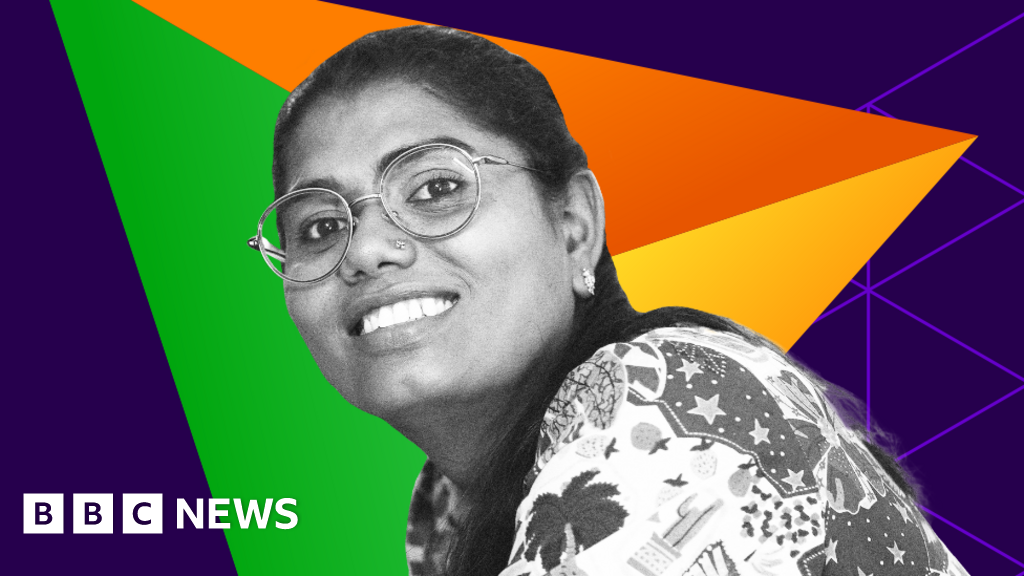By Zoya Mateen,BBC News, Delhi
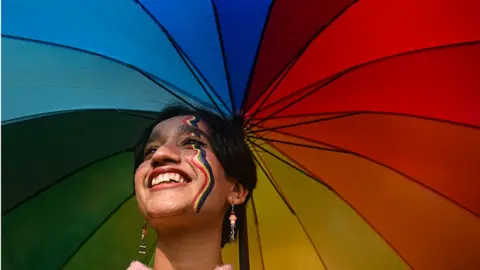 Getty Images
Getty ImagesMadhu Bai says she is like a rainbow. She rose from a storm, fleetingly spread joy and then returned to the sky.
The 44-year-old made history in 2015 when she became the first trans person to be elected a mayor in India. She won in Raigarh, a small town in the central state of Chhattisgarh.
But when her term ended in 2020, Madhu returned to her old life without a pension or government benefits. She dances and sings with other hijras, or trans women, at weddings and birth ceremonies – a common livelihood in India’s transgender community.
Madhu has no intention of re-joining politics. She says she is tired and thinks it’s too polarised.
“I fought, won and worked for the people. Now I want to live for myself.”
Madhu’s short but successful political foray in India is a rarity in a field where the LGBTQ community is still heavily underrepresented.
It’s perplexing, activists say, in a democracy where acceptance of sexual and gender diversity has been on the rise and the community has seen many wins.
Over half of Indian adults now believe same-sex marriage should be legal, according to a Pew survey.
But LGBTQ Indians cannot only rely on the courts for change, as a ruling from the top court to not legalise same-sex unions demonstrated last year.
Judges declared that changing the law was a matter for politicians, not the justice system.
Campaigners say that LGBTQ politicians are the best advocates for their community. Yet in this year’s general election, no major political party has fielded a single openly LGBTQ candidate.
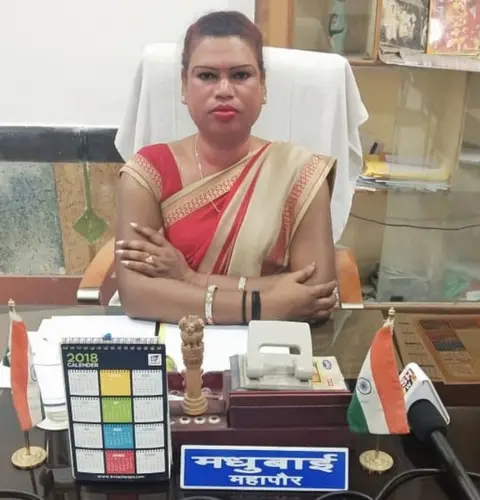 Madhu Kinnar
Madhu Kinnar
“Queer people have been left out of conversations, told politics is not an avenue for them for so long,” says Anish Gawande, a writer and founder of Pink List India, the country’s first archive of politicians supporting LGBTQ+ rights.
“They never got the chance to build the necessary structures to advocate their demands.”
No-one knows this better than Madhu. She says overcoming the ridicule and contempt of her opponents was more challenging than wooing voters, who connected with her instantly.
After going door-to-door with her friends for days, asking for money to fund the campaign, she struggled to get a party ticket.
Indian elections are expensive, and contesting independently without political funding is costlier. But she had no option after the two main political parties rejected her.
When she won, she thought leaders would take her seriously. They didn’t.
At her first meeting, she says, members of several parties walked out. She alleges that a local leader threatened to slap her because he found her dance videos offensive. There were also days, in the beginning, when Madhu said she felt unsure whether she could use the women’s washroom around party workers.
“People loved me and my work, but rivals hated my guts,” she says. “Behind the ridicule and abuse, I know they were all thinking the same thing: ‘How could a hijra be the mayor?'”
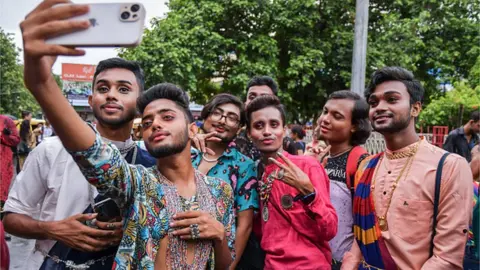 Getty Images
Getty ImagesCampaigners say things have changed since Madhu won her seat.
Today, more Indians know someone who is LGBTQ than they did a few years ago. Even some politicians, who were once wary of the subject, are becoming allies and promising more rights.
“Political parties in India are slowly peeping out of the closet and talking more prominently about LGBTQ rights,” says Harish Iyer, one of India’s first openly gay persons to be involved with a political party.
There’s also a growing momentum among the youth, who, Mr Iyer says, want to “do away with homophobia once and for all”.
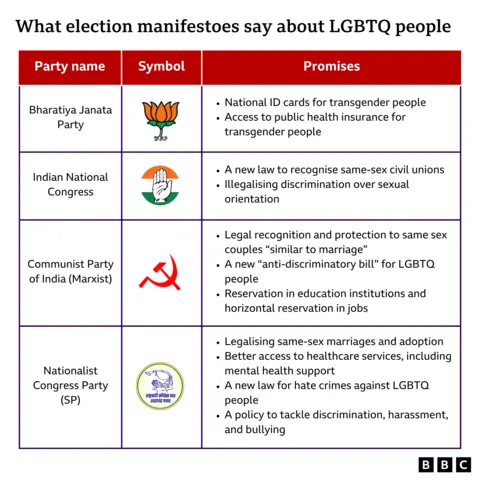

This year’s election campaign comes months after the Supreme Court decided to not legalise same-sex unions.
Three opposition parties have promised to recognise same-sex couples legally, but the governing Bharatiya Janata Party (BJP) – which polls suggest is likely to win a historic third term – has not.
Despite this, Mr Gawande insists that LGBTQ rights are a current that Indian politics can no longer dismiss. The community’s social and cultural capital is “far in excess of its numerical strength”, he says.
He expects the near future to bring wins on recognising relationships, affirmative action for trans people and access to healthcare.
Some of these fights might not grab headlines – especially those affecting poorer people, who are at the sharp end of exclusion from jobs, education and political opportunities.
“LGBTQ struggles need to be seen through the lens of caste privilege,” says Grace Banu, a Dalit (formerly untouchable) trans woman activist from the southern state of Tamil Nadu.
Born in a poor family, she says she first faced discrimination because of her caste, and then over her gender.
When she came out at the age of 14, her school barred her from taking classes and made her sit under a tree as punishment. When she resisted, her parents put her in a psychiatric hospital to “cure her illness”.
“I would tell myself that this cannot be my destiny,” she says. “One day, I ran away to make my own fate.”
Today, Ms Banu is a software engineer, the first trans woman with an engineering degree in her state, and considers herself a mother to 12 trans women.
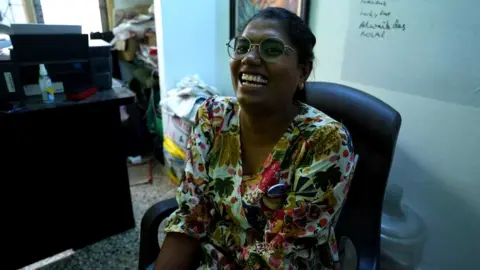
She lives in Chennai with a clan of three trans women, all of whom are also involved in the anti-caste and trans rights movement.
Sprawled in the living room, they talk passionately about their lives, the conversations swerving across topics. One moment they are discussing their next court battle and the next minute they are wondering what to eat for lunch.
“The transgender, or the LGBTQ identity, is not a monolith,” says Ms Banu, while her friends busy themselves in the kitchen, the clatter of plates occasionally interrupting the afternoon stillness.
The 44-year-old recently petitioned an Indian court seeking “horizontal reservations”, or separate quotas for transgender people in government jobs, within the existing quotas for historically disadvantaged communities.
Ms Banu stresses that being transgender varies vastly across caste and class lines. Her fight, she says, focuses on the most marginalised.

At the other end of Chennai, in an upscale apartment along the sea, lives Apsara Reddy, a trans woman and spokesperson of AIADMK, one of Tamil Nadu’s main political parties.
A former journalist with degrees from Australia and the UK, Ms Reddy’s is a life of luxury: she drives a shiny silver Jaguar, collects art and wears the finest of silk saris.
Ms Reddy acknowledges her privilege, but says: “In politics, you need to look at the larger picture. You can’t just be the voice of your own community.”
Ms Reddy hasn’t contested in an election but if she does, she doesn’t want to be typecast “as an LGBTQ flagbearer” of her party.
“If you want to judge me, do it on the basis of my potential as a policy-maker, not my gender identity.”

Activists say few in the LGBTQ community are able to come out like Ms Reddy, let alone conceive a life in politics.
Mr Gawande suggests that for a long time, the community was never a political priority.
The battle for equality taking place in the courts made it difficult for them to build relationships with other marginalised communities under a broader fight for equality, he says.
Now he wants the community to focus on grassroots political activism, which he believes will raise the profile of LGBTQ issues.
Mr Iyer, however, believes the ball is now in the court of the country’s leaders. “We are your friends, your family, customers, beneficiaries; we are everywhere but you haven’t looked for us. If you call us, we will come to you, and that’s what we expect from political parties.”
Back in Raigarh, Madhu says it gets hard to get by sometimes, without a fixed pay. But given the life she’s had, she’s not constrained by what may lie ahead.
“Whatever it is, it’s definitely not politics,” she says, her jaunty sing-song voice soaring into a laugh.
But she hopes others from the community seek political opportunities, so that queer people are no longer seen as oddities.
“Who knows, maybe then the country will see a rainbow again.”
Videos shot by Prem Boominathan and edited by Danish Alam

